
Interview by Farran Golding / Photo by Norma Ibarra
Fabiana Delfino’s charging approach with skateboarding mirrors a straight to the point mindset towards life in general. Her sense of self-belief lacks any conceit whatsoever which leaves you thinking, simply and respectfully, “Here’s person who knows what they’re about.”
For the next in our series of Credits interviews one half of Boca Raton’s pro sibling double act talks growing up in Florida, the enduring influence of Mimi Knoop and the career she’d originally planned before the one she’d ruled out came to fruition.
If you can dream about it, you don’t think it’s possible so it’s been a fucking crazy ride.
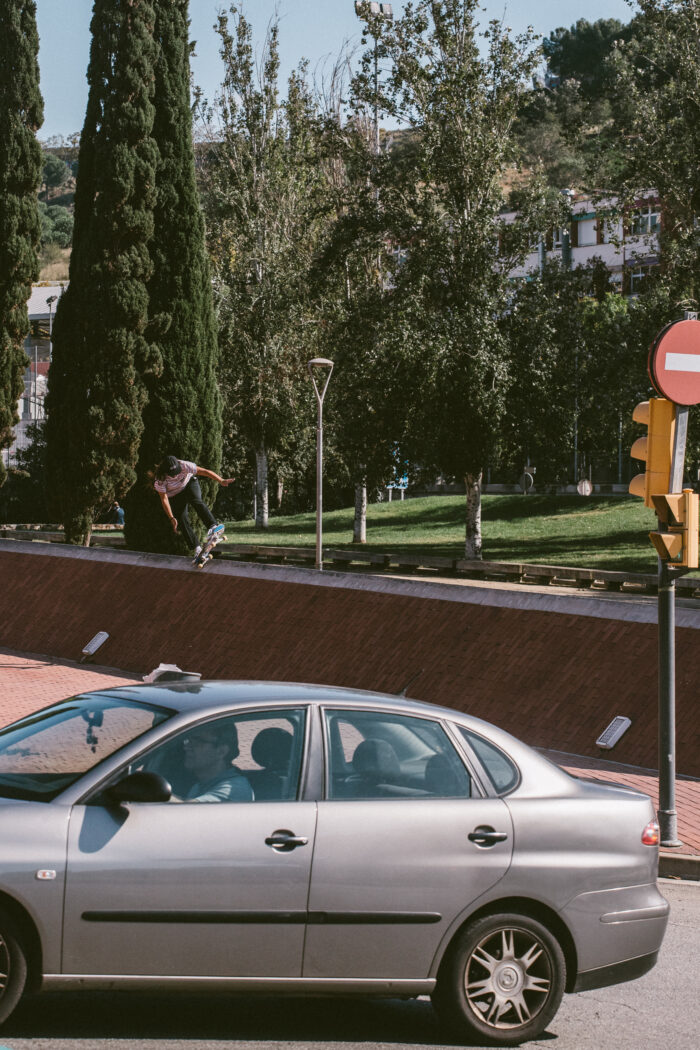 As your dad’s a surfer was he stoked when you and Pedro got into skating; like you’d both taken up the next best thing?
As your dad’s a surfer was he stoked when you and Pedro got into skating; like you’d both taken up the next best thing?
Yeah, kind of. Growing up, my dad always had us in the water so we would go surfing alongside him. We dipped into a bunch of different sports, whether it was soccer or tennis, and skating wasn’t any different at first. I think he liked it because he could relate to my brother and I. He dropped in for the first time when he was 60 and he still likes to cruise around on a longboard.
What was it about skating that appealed to you more than surfing?
It must have had something to do with what everyone else was doing at the time. Rollerblading was really big in Florida when I was younger so once it faded away skateboarding became the main focus around kids in our neighbourhood. It just grew from there. There were kids at my local park every day, morning to night, and there was a big skate community in Boca but it was mostly centred around the park. It wasn’t like you’d show up and you’d be the only person skating, there was a lot of kids growing up, learning to skate, at the same time.
Obviously it’s a huge place but I’m always surprised to find out how many notable skaters have come out of Florida. Off the top of my head there’s Andrew Reynolds, Elissa Steamer, Josh Stewart and Brad Cromer and then the Tampa competitions are a big part of skate history too. Were you always conscious of Florida’s heritage in that respect?
I always knew Andrew and Elissa are from the West Coast of Florida. It didn’t click that Florida was like a skateboarding Mecca with the Skatepark of Tampa. It’s only recently I’ve noticed the impact Floridian skaters have made on the whole. I guess it’s taken me by surprise but I’m also not surprised why Floridians are where they are. The Skatepark of Tampa is a huge part of it because, for over twenty years, there would be pros coming to visit a part of Florida where you wouldn’t expect anything [going on].
Did you skate there much or get familiar with the scenes in Florida outside of Boca Raton?
I went more in my teens when I was able to drive. Once I graduated from high school I was given more slack on my leash from my parents so I was able to go to Orlando and stay for the night, go film with a friend, take day trips to Jacksonville or go to Tampa a bunch. I had a kind of restraint as I was growing up, being the younger sibling and also female, so once I was of age I was like, “Alright, I’m going to take this into my own hands and go wherever I want to go, whenever I want to go.”
It’s a cliché but there’s always that story of finding skateboarding and every other interest goes out the window, but you were into soccer for a long time and really good it too. Do you think the contrast between doing a team sport and the independence of skating gave you a bigger appreciation of both?
Absolutely. That [distinction] definitely takes up a big part of it. I enjoyed participating in a team sport because you’re not in it by yourself, you have people behind you. You’re not thrown onto the field and it’s one-on-one. You have people there to build you up. It’s two different playing fields but I always admired the fact I didn’t have to play soccer alone. I could skate alone, I could bike alone but with soccer you’re surrounded by other people with a common goal and I really enjoyed that.
There’s still a parallel there to skating and the relationships we have with our crews of friends.
Even as I was just telling you that, I realised I feel like I have that now. Whether it’s with Santa Cruz or Vans, it is very similar. It’s almost come full circle.
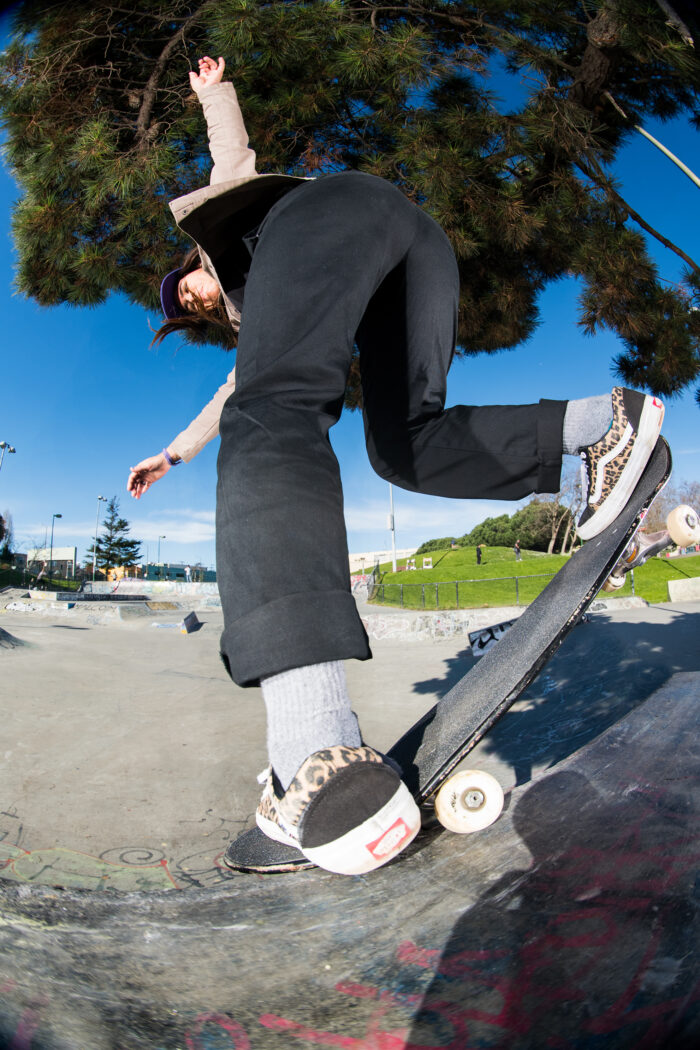
Backside nosegrind. ph: Eric Palozzolo / Inset above – mayday grind in Barcelona. ph: Ibarra
You studied business management at university, so were you already figuring out a career related to it before skating took off?
I’ve always been interested in entrepreneurship and looking at the skateboarding industry, as a young kid, I was drawn to that aspect. Less about being an “athlete” and more in regards to working behind the scenes so that grabbed my attention first. I didn’t think I would have a place within skateboarding, as a skater, so I had this dream I’d run my own business, like a deck company or a skate shop. It’s always been an interest of mine so it made sense to go study business.
You’re pretty tight with the shop back in Boca, so does that stem from hanging out there and seeing what goes on day-to-day?
Definitely. When I was 14/15 I’d come by and ask the owner, Lynsey, a bunch of questions. I was very observant and it was interesting to see how skate shops run, who’s behind it, who’s buying the products, what makes somebody choose a certain product to have in their store over others. My curiosity was amplified knowing I could walk into my local skate shop and learn all of these things.
I’ve skated for most of my life and to see something come out of it at 18 is weird. It’s really surprising. I never thought I’d be in the position I am now. If you can dream about it, you don’t think it’s possible so it’s been a fucking crazy ride which has happened fast but somehow not so fast at the same time. I’m taking it day by day.
The meaning behind them building this brand was to give women a reliable space and source of support which they maybe wouldn’t get from a big brand. I was drawn to it for that purpose and because they had a stacked team.
Mimi Knoop has played big role in your life. Could you tell me about the history of Hoopla Skateboards, the brand she founded with Cara-Beth Burnside, and what it opened up for yourself and others?
I’d watch Mimi and Hoopla Skateboards from afar via YouTube and videos. I think I got her email address to ask if there were any spots available for a contest. We kept in touch, eventually met and that’s when she offered to give me some Hoopla boards.
I want to say [the company] began in 2011/12. Mimi and Cara-Beth started Hoopla to create a platform for women in skateboarding because before Hoopla, or Meow Skateboards, women didn’t have that big of a shot to receive sponsorship.
The meaning behind them building this brand was to give women a reliable space and source of support which they maybe wouldn’t get from a big brand. I was drawn to it for that purpose and because they had a stacked team: Nora Vasconcellos, Allysha Lee, Samaria Brevard and Breana [Geering] was on. It’s a very attractive realm of skateboarding to see an all women’s team.
The brand has a big significance in skateboarding through, like I said before, giving people who don’t have a platform a place to express themselves whether it’s through skateboarding or art and design.
Plus, just going off the handful of women you mentioned, Hoopla’s impact is even more significant because they’ve all gone on to become known names.
Definitely and I’m really happy you’ve brought this up because we’re reaching the four or five year mark since Hoopla stopped being around. It’s really important the vision Mimi and Cara-Beth had is still known and talked about.
I always thought I would be the one surprising my brother with his pro model, I thought I’d be a part of his story. For everything to go down on that day, with both of us turning pro, it was a moment of “We did this.
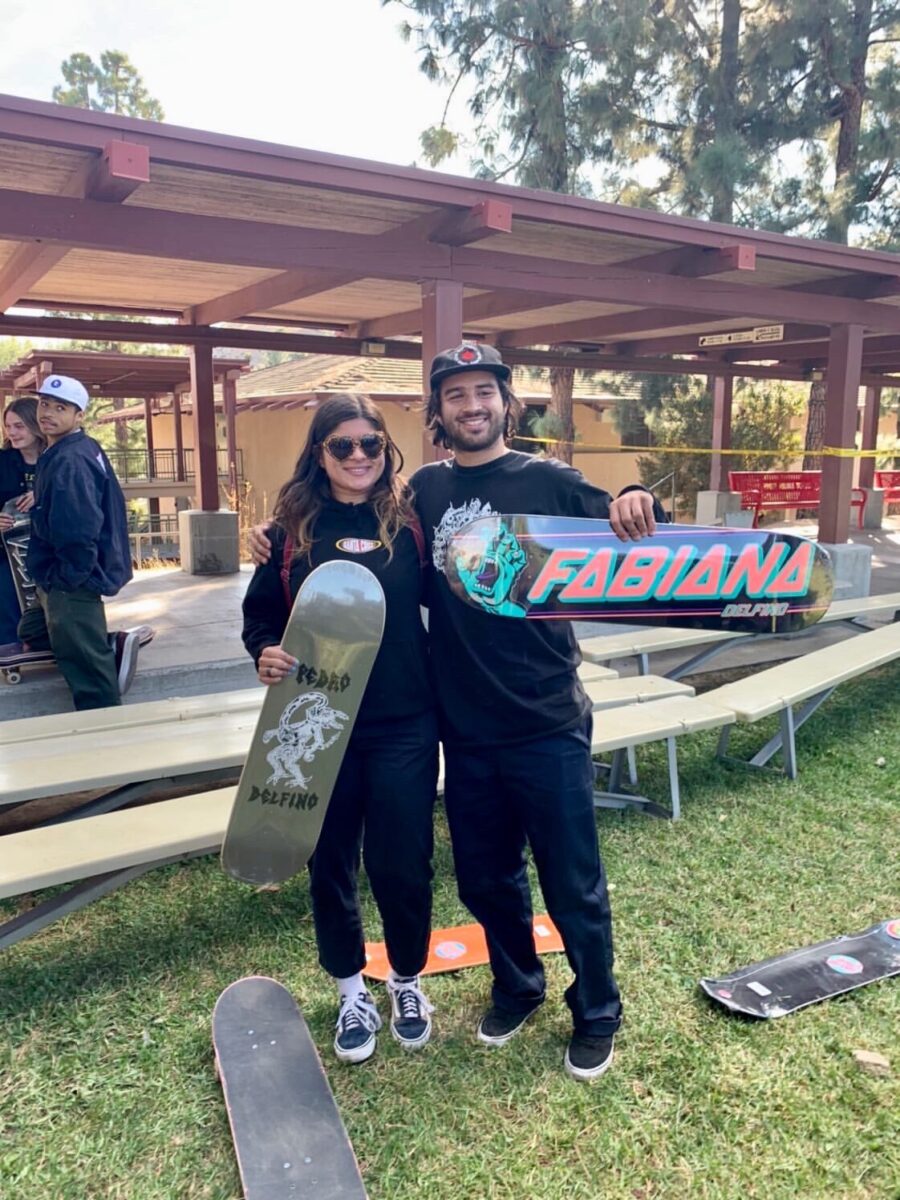 Over the last few years you and your brother, Pedro, have come up alongside each other and you even turned pro on the same day. That must have been surreal.
Over the last few years you and your brother, Pedro, have come up alongside each other and you even turned pro on the same day. That must have been surreal.
It’s so nuts. Santa Cruz hit me up a few days after I got back from a Vans trip to Barcelona. “Hey, we need you to come to L.A. – we want to film something at The Berrics and grab some b-roll at Bust or Bail” – the comp at that famous Arto Saari double kink rail.
I showed up and it was pretty normal. I thought I’d be going to The Berrics the next day. We show up to Bust or Bail and the contest went on, I saw my brother and we’re all hanging out. Towards the end Neckface was on the mic, like, “Can we bring up the brother and sister skateboarders we’ve got here, Pedro and Fabiana!”
I heard that and thought, “Oh fuck.”
I already knew what they were going to say. Why else would they say that? It was a moment where you get into a dream state where you don’t know what’s real or not.
I rocked up, I saw my parents holding our boards and that’s when it really hit me, it was very emotional seeing them there at the top of the stairs. It was nuts.
I always thought I would be the one surprising my brother with his pro model, I thought I’d be a part of his story. For everything to go down on that day, with both of us turning pro, it was a moment of, “We did this.” It was a very special, united moment and an unforgettable day.
Do your parents get one of each of your boards each time there’s a new series?
Oh yeah, they get all the boards. Everything is theirs. My dad gets stoked every time. He wants to put all of our boards on the living room wall but I’m not a big fan of wall boards. If it’s in your room it’s one thing, but I keep telling him it’s going to look tacky with boards above the TV [laughs]. He can do it if he wants. They’re stoked.
When I interviewed Brandon Westgate he said that when he’s trying to explain his job to his neighbours it’s easier to just tell them to Google him. Do you think your parents have ever dropped that one to their friends when they get asked how the kids are doing?
That’s a good question! I don’t know what they tell their friends. Maybe that’s what the issue was growing up was. We had some resistance from our parents about taking skateboarding as seriously as we did. I think a lot of it had to do with what they’d tell their friends or how they’re going to explain it to my grandma about what we want to do in the future. Now, they’re stoked to talk about that for my brother and I but I don’t know, I explain things to people [who don’t skate] by saying I’m a “brand ambassador”.
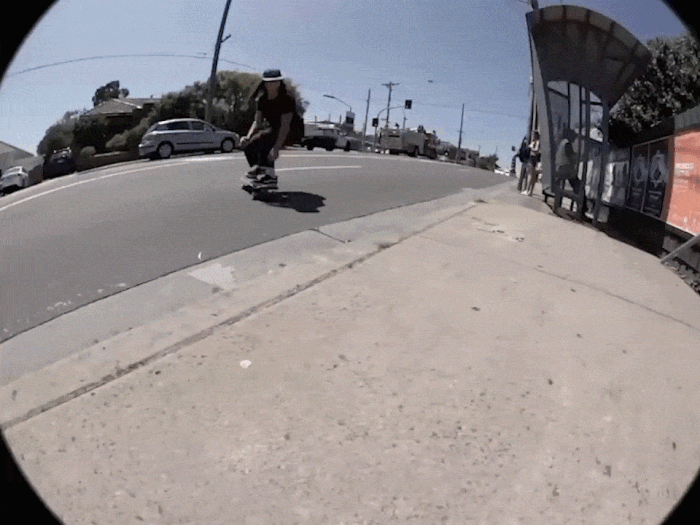
Credits
The fact we’re tight, and all in this together, gives a sense of relief because shit can’t go that bad.
Credits has been pretty a tight knit video. How’s it compared to working on Till The End?
A lot of aspects of filming for Credits were similar and different to filming for a larger scale project like that. Obviously, there are maybe six in total of us starring in the video versus, like, ten people.
This is the first time I’ve ever been able to film and travel with my best friends on someone else’s bill. I’ve thought of it as a homie video which is sponsored by Vans. It’s been like filming at home and being stoked on the clips that you got. Then, at the end, it just so happens to be a huge project for Vans and that’s cool.
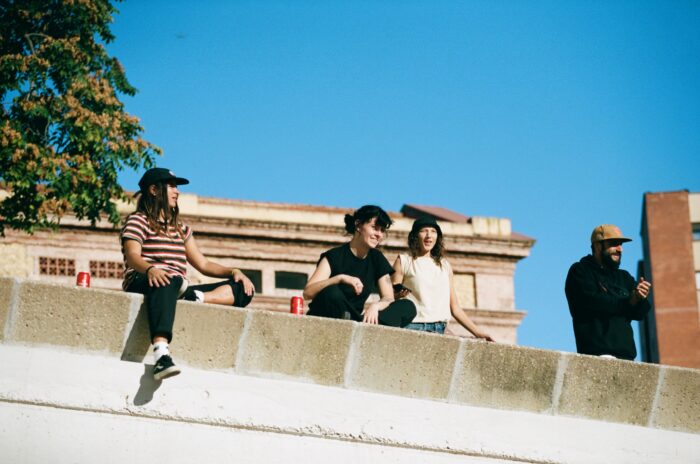 Did that ease any pressure off?
Did that ease any pressure off?
Yeah, I think we all felt pretty solid the whole time because we know what we’re capable of and the fact we’re tight, and all in this together, gives a sense of relief because shit can’t go that bad. Feeling the love and support from Vans from day one, it’s like when your boss gives you a compliment and it means a lot because it’s someone of importance, I guess. So there hasn’t been much pressure.
Was it difficult to juggle Credits around other obligations like comps?
Not really, I didn’t let it clash. I knew I was going to be working on this and I wanted to create the space and time for it because it was a special thing. I went on fewer Santa Cruz trips and didn’t do anything I didn’t have to do because I wanted to dedicate my time to Credits. The Vans Showdown contest and the women’s contest at Tampa; none of that interfered with the filming trips. I don’t really skate contests at all. I don’t like it [laughs].
I wanted to ask about that because you won that Vans Showdown last year. Is it just “part of the job”?
I really don’t fear contests or get nervous. I don’t mind having to skate one and that’s changed over the years. For me, filming a part is above all so it doesn’t matter how I do in a fucking contest.
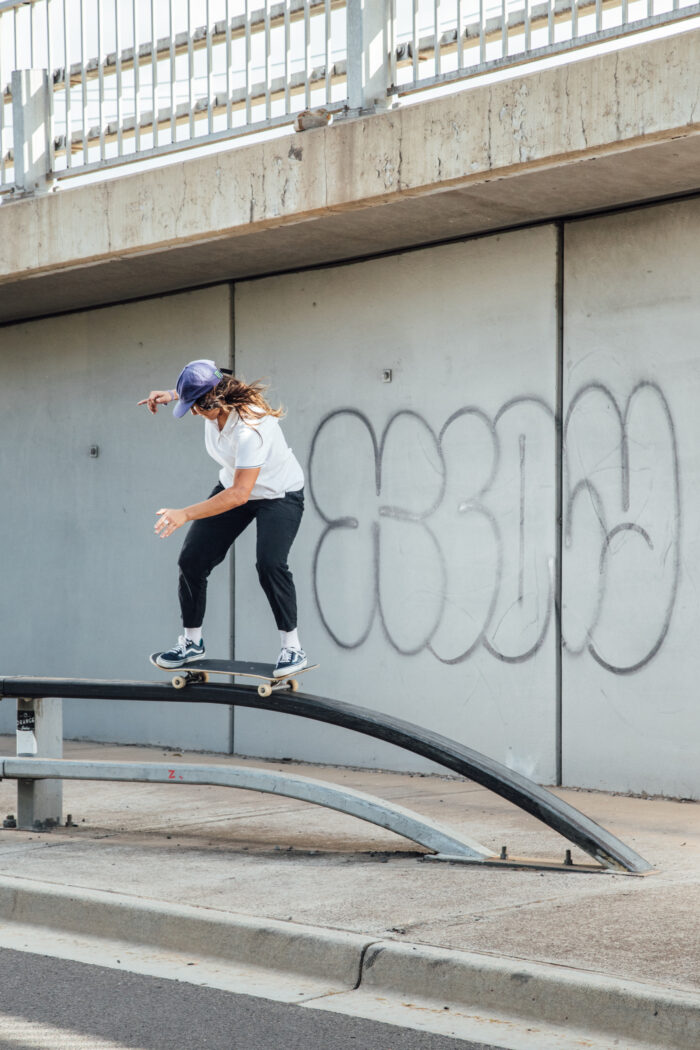
Switch 5050. Inset above – Fabiana, Breana, Helena Long and Frank Mare in Barcelona. ph: Ibarra
Just go out there and make it happen for yourself … I think Breana and Una would say the same thing. We just want to see girls getting out there and getting it.
What’s the main thing you hope people take from Credits?
What I want people to get from this video is that a) skateboarding with your friends is beautiful thing do and b) just go out there and make it happen for yourself. Just go out there and film. I really want women to film in the streets, I want them to want to do that and I think Breana and Una would say the same thing. We just want to see girls getting out there and getting it.
I imagine that right now is the longest you’ve been able to relax in one place for a while. How do you wind down and stop yourself from getting burnt out in general?
As skateboarders we have the advantage that we get to do the things we love as a career. Obviously, that’s a great thing but there’s another part of the job where, as you said, you’re travelling a lot and missing out on things. You’re putting your body to the limit.
For me, the last two years have been very hectic. Having a few days between each trip is nothing I’ve ever handled before so I think it’s just prioritising yourself and positive things. When I’m back from a trip I’ll do some retail therapy, go to the thrift store, get my nails done. Just specific things that elevate my mood and get me excited to be home.
I’m skateboarding every day when I’m home. Depending what time my flight gets in, I’ll be at the skatepark the same day. Getting clips is very rewarding but skating at home, for the fun of it and because I want to do it with no pressure or strings attached, that’s when it’s the most enjoyable. I don’t take two weeks away from skating because I’m tired of it. I ease into it.
Frank, Breana and Fabiana. ph: Ibarra
Previously in our Credits series: Shari White – “All the pieces of the puzzle.” / Una Farrar – “A VX was always the end goal.”
Next: Breana Geering – “If I be myself, I think it’ll be okay.”


